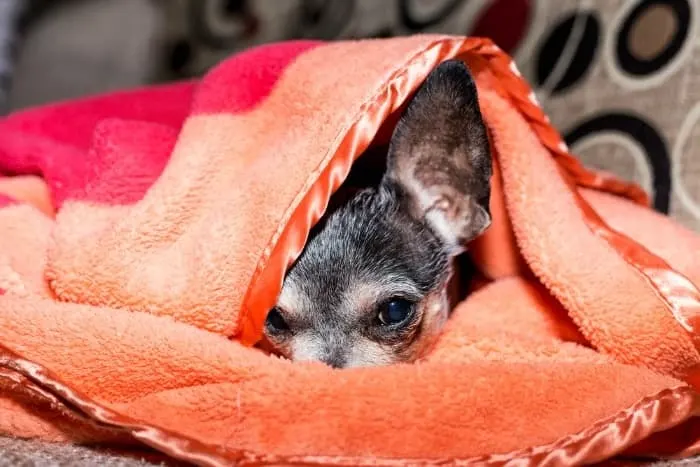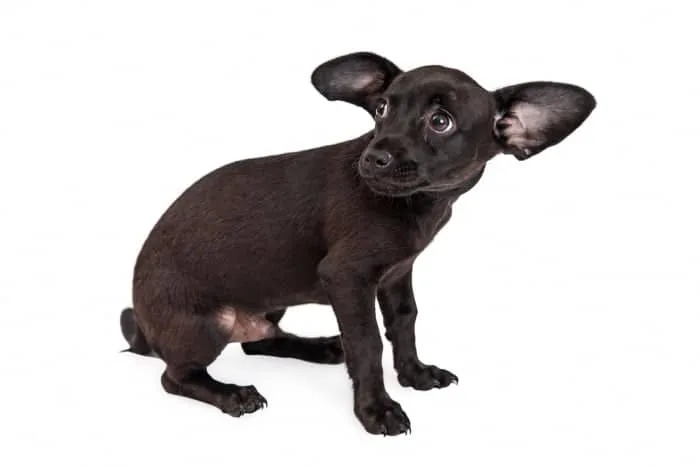
As an Amazon Associate, I earn from qualifying purchases.
Any Chihuahua owner will tell you that their pup has a big personality. Chihuahuas can be feisty, quirky, friendly, bold, timid, sassy, or even snarky.
That’s part of why the breed is so darn lovable: every Chihuahua is different in their own way.
That said, sometimes, a personality trait goes too far.
Overly-timid Chihuahuas can be hard to train. They can have obedience issues in public and may lash out at friends or family.
It’s hard to see your Chihuahua be so fearful. Fortunately, Chihuahuas are a trainable breed. Any shy Chihuahua can come out of their shell with proper training and encouragement.
Let’s take a look at how to help a timid Chihuahua!

WHY ARE SOME CHIHUAHUAS TIMID?
A shy dog is usually a scared dog. Chihuahuas act timid when they are afraid of a situation.
If your Chihuahua didn’t receive much socialization as a puppy, they might be fearful of other dogs or new people.
Perhaps your Chihuahua is only timid in public. Loud cars, bright lights, and big crowds can be terrifying when you’re only nine inches tall!
Shyness is sometimes a learned behavior.
It’s natural to comfort our dogs when they are afraid, but treats and snuggles reinforce a Chihuahua’s fear response. They learn that timid behavior leads to a desirable outcome.
Some chis, just like some humans, are just naturally shy. You can’t change their personality, but you can help them to be more comfortable around others.
Finally, shyness may be a sign of a bigger issue. If your Chihuahua is normally bold and brass but recently began acting timid, he or she may be sick or injured.
You know your dog best. Any out-of-the-ordinary behavior warrants a visit to the veterinarian.
IS SHYNESS NORMAL IN CHIHUAHUAS?
It is perfectly normal for your Chihuahua to prefer your company. Maybe you are the proud owner of a “velcro-dog” that is glued to your hip 24/7.
If you haven’t used the restroom alone in years, you know this type of dog.
So, do you always need to train away shyness? Not necessarily,
If your Chihuahua is otherwise happy and content, extra training is not necessary.
But if your Chihuahua’s timid behavior interferes with everyday life, they will benefit from a little help overcoming their fears.
SIGNS OF SHYNESS IN CHIHUAHUAS
Always remember that a shy chihuahua is a scared chihuahua.
A timid Chihuahua will behave as if they are being threatened.
There are several ways that a Chihuahua may display shyness:
- Ears lying flat against the head
- Panting
- Dilated pupils
- Avoiding eye contact
- Tucking the tail
- Urination
- Attempting to run away
- Excessive barking
- Snapping or biting

CAN CHIHUAHUAS GAIN CONFIDENCE?
A dog’s personality will never be fully changed by training. The success of training depends on your Chihuahua’s age, socialization, and life experiences.
However, even the shyest dogs can learn to trust a handful of people.
Take Mia, for example. She is an elderly Chihuahua that has struggled with timidity and anxiety for most of her life.
Well-timed treats and smart practices went a long way for Mia. She was able to gain confidence and behave calmly around a new person after a single training session.
HOW TO TRAIN A TIMID CHIHUAHUA
Training your timid Chihuahua can start today.
Stop comforting them when they act shyly. It may be counter-intuitive, but comforting a shy dog does more harm than good.
When you comfort a timid dog, they interpret your behavior as reinforcement. They believe they were right to be afraid of the situation.
Instead, ignore your Chihuahua’s shy behavior and reward curious behaviors.
Ignoring shy behavior shows your Chihuahua that they have nothing to fear. In short, they learn that nothing bad is going to happen.
Eventually, your dog will tire of being ignored and grow curious.
Curiosity shows that your Chihuahua feels comfortable. They may sniff a new person or explore a new area.
Always reward curious behavior! Your Chihuahua behaved bravely, and you want them to know that you approve.
Add structure to your timid Chihuahua’s schedule. Obedience training builds trust between a dog and its owner. This trust can then be expanded.
Even simple rules and boundaries may help your Chihuahua feel comfortable in scary situations.
SHYNESS IN PUBLIC
Is your Chihuahua a ball of energy at home but shy in public?
Exposure therapy may help. This strategy gets your dog out of its comfort zone in slow, manageable steps. Consistency and patience are key.
Take your dog into public every week. Start in small increments: a 10-minute walk is better than spending an hour at your favorite pet-friendly restaurant. Your Chihuahua will slowly be desensitized to outdoor stimuli.
Bring a handful of treats with you every time you train your Chihuahua. High-reward treats should reward curious social behaviors. If you approve of your dog’s actions, let them know.
Chihuahuas thrive with encouragement and positive reinforcement.
Go somewhere new every time you take your Chihuahua out of the house. Exposure to different types of situations will strengthen your bond with your Chihuahua.
Remember to train at your Chihuahua’s pace. If an outing is too much, never be afraid to go home early.

SHYNESS WITH GUESTS
Training your dog to be comfortable with guests is similar to training them to be comfortable in public. You will work in small increments and reward positive behaviors.
Start small. Invite a guest to your home for 10 to 15 minutes and let them know you are training your Chihuahua.
Your home is your Chihuahua’s safe space, and too much exposure to a new guest will hurt their training.
When your guest arrives, slip them a dog treat to give your Chihuahua.
Smelly treats like bacon work best. Reward curiosity and ignore shyness. If your Chihuahua sniffs your guest’s shoes or walks over to them, have your guest give them the treat.
Your Chihuahua will come to associate new guests with treats.
When your Chihuahua is comfortable enough to lie down next to a stranger, you have succeeded with training.
USING THE BODY LANGUAGE METHOD TO HELP YOUR TIMID CHIHUAHUA
When you use this method to help train your Chihuahua, you are basically telling everyone that they need to keep their voices down. You are choosing to use a calming and quiet approach so as not to startle your Chihuahua pup.
Body language has a huge role to play when it comes to your Chihuahua. Since they are such a small breed, avoid bending over to interact with them. Instead, get down to their level this means crouching down on your knees. This will allow a higher comfort level to build, and it won’t seem to your Chihuahua to be overly aggressive behavior.
It is also a good idea to avoid eye contact. Instead of looking directly into your pup’s eyes, try staring at their ears or their paws instead.
HOW DO YOU BOOST YOUR DOG’S CONFIDENCE?
As touched on briefly above, boosting your dog’s confidence is essential when helping them not be so timid. Start with basic obedience training and regular walks. Learn how to respect their fears and allow your dog to set the pace when it comes to getting over those fears. Help him from establishing bad behavior by teaching him basic behavior early on. Help guide him through stressful and scary situations and train them so they know how to handle new situations that may arise.
WILL ANOTHER DOG HELP A TIMID DOG?
Allowing a timid dog to spend some time around other dogs can go a long way in helping them feel safe and lower their stress level. With a little encouragement and comfort, a timid dog can do things you didn’t think were possible for them to do.
However, before introducing another dog into your household, consider what would happen if things didn’t work out as you planned. More time will need to be spent with the dogs, along with some more training time.
Chihuahuas are pack animals and are very social, which is also something to keep in mind. They tend to like only their own breed as well. So, it might not work if you try to introduce a timid Chihuahua to a larger dog of another breed. It might just cause their stress level to rise even more.
FEAR AGGRESSION IN DOGS
Fear aggression in dogs is mostly characterized by rapid nips or bites. It is when a fearful or timid dog feels motivated to bite and then runs away. A lot of the time, this kind of aggression doesn’t come with a warning either. They may not show their teeth or growl before their fear aggression comes into full display.
When trying to tell the difference between fear and fear aggression in dogs, remember that fear is a common cause of aggression. If a dog is scared, it will run away from what is scaring him. This is the fight or flight instinct.
Before a fearful dog bites, they may show some signs of anxiety, make direct eye contact, show the whites of their eyes, growl, and show teeth. However, again, if it is fear aggression rather than fear, these signs may not show at all.
TAKEAWAYS
Don’t be discouraged if training doesn’t work right away. Every Chihuahua is different. They all have their own time-table.
The most important thing to remember is that your Chihuahua loves you. They trust you, and they will grow to trust others as well.
At the end of the day, a timid Chihuahua is still your best friend.


Valerie Manon
Wednesday 29th of May 2024
I'm sorry to hear about Lucas. I'm sure he will respond well with treatment. You can give him his shot. We will do anything to help them. They are our babies.
Cathy Bendzunas
Wednesday 29th of May 2024
Yes, I would do anything for him and my other pups. After 3 shots, he's already feeling better and eating better.
Antonio
Thursday 4th of May 2023
I got my deer head Chihuahua at 10 months old. Since I got him he will not come to me. He runs away from me. Won’t let me pet or touch him. He tries to bite me even if I come close to trying to pick him up. Jumps in fear when I move or get up or approach him. He is completely terrified it seems. I’ve had him for over a month now and he has ran in the bathroom and stayed behind the toilet for over 4 weeks straight and would not come out. I would love to try to work with him but it seem there isn’t any hope for him with me. Day after day there hasn’t been a change in attitude. I managed to put a leash on him and he jumps and pulls for dear life. Now if I even come close to him he tries to bit me even more. I don’t want to take him to a shelter but it seems inevitable.
Cathy Bendzunas
Thursday 4th of May 2023
Is he food motivated at all? If so, try putting some high-quality treats in your hand and just sit on the floor while reading or watching TV or something. ignore your dog but keep your hand open where he can see the treats. When he eventually gets up the nerve to approach you to get the treats, don't look up or move, just ley him get the treats. Do this every day for about a week and then graduate to talking softly to him while sitting and waiting for him to approach but still don't look at him. Keep up this and gradually each week, add something, like the following week, look at him while talking to him (but don't stare), the week after that, put the treat in your lap. When he gets comfortable taking the treat from your lap, see if he will let you pet him. This is a long process and make take months but it usually works. Your other choice is to get a dog trainer to help you. Just make sure they use positive reinforcement. Negative reinforcement definitely won't work with your dog.
Coni
Thursday 29th of December 2022
I have a 5yr old deer head chi that after I got him he acted like such a cuddle bug then out of the blue attacks my 13 yr old chi while sitting in my lap after reading this article I see now it is fear aggression it took a while to get the two to get along and they are doing better but I recently got a new puppy and he seems scared to deaf of her one minute then curious but only when I'm in close distance of them both if the puppy gets to close wanting him to play his hair all the way up his back stands up and then he will snap fiously at the puppy I try to not let them out of my sight and praise him when he remains from the attack mode as soon as I see the hair start to stand up I tell him it's ok to be nice then I tell the puppy to leave her brother alone and soon as puppy is not watching or too close he runs for the chair and shakes for little while or he will curl up on my shoulder and snuggle as close as he can an calms down. Dani (chiwawa) dose not play or even know what a toy is I'm his third owner I don't know much about his up bring other than he grew up with a sister (sibling) an when there human mommy died I friend of mine had the two we tried to help find a home for them together but because that did not work my friend kept the female and I kept Dani my friend will bring her over to visit now and then and he is so excited to see her but she doesn't want anything to do with him a ND will snap and growl at him. Do you have any suggestions that may help me getting him past his issues.
Cathy
Thursday 29th of December 2022
Sorry Coni, but I won't be much help. Dani sounds like he has issues that only a dog behaviorist could help solve. CBD oil might calm him down and is definitely worth a try. And I would not leave him alone with the puppy.
Patricia Tichacek
Thursday 22nd of April 2021
My Chi is going to be two, afraid of unusual sounds, refuses to walk outside on leash, always looks around her surroundings when outside if something scares her she runs to the back door. My yard is fenced in very quiet neighborhood however if a car goes down street and is loud she runs to back door. I gives her treats, praise her etc any answers
Cathy
Thursday 22nd of April 2021
I think she may be a good candidate for CBD oil. We use King Kanine.
Cathy Mayfield
Saturday 2nd of January 2021
Great articles, Miss Cathy! Hers is probably fear aggression. She loves when friends or family come! She’s not aggressive with them. Even my great grandson who is 9! She will growl and nip when she’s afraid. She tries to control me! I let her know that I am the pack leader....